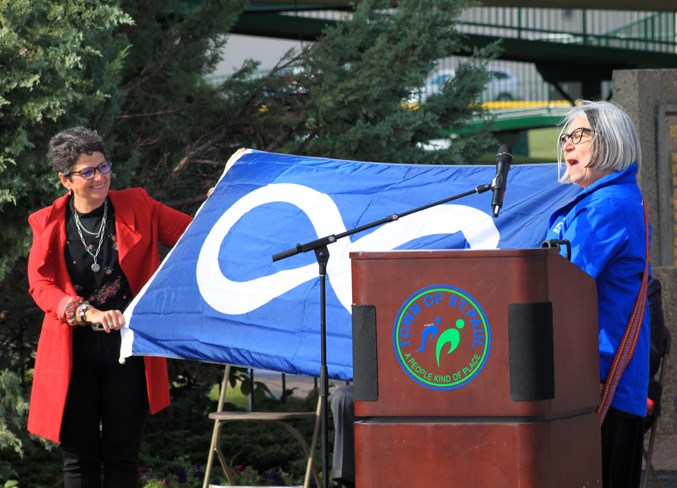The flag of the Métis Nation was raised in St. Paul Saturday morning taking what many people believe to be its rightful place in a community deeply rooted in Métis history.
Delegates to the 91st Assembly of the Métis Nation of Alberta (MNA)
together with local and provincial dignitaries gathered at the Landing Pad for the opening ceremony of the assembly and the raising of the Métis flag, which first flew in this country in 1815.
“We are indigenous to this country because we were born of the land long before Canada was a country,” MNA President Audrey Poitras said. “We are a distinct nation of people drawing from our First Nation ancestry and from our European forefathers. We adapted their customs and traditions and made them our own. We were the backbone, the movers and the shakers of the fur trade and we continue to be the voice of the Métis people here."
Poitras said the raising of the flag symbolizes that the Métis people are living in a time of recognition and she thanked Town of St. Paul Mayor Maureen Miller for her commitment to reconciliation.
“The time has come to recognize the contributions made by the Métis people to this town, to this province, to this country and by working together we can move forward,” Poitras said. “The past is the past and it has made us who we are today and that is a nation of proud citizens, proud Albertans and proud Canadians. We have fought long and hard to ensure that our rights as an indigenous people were recognized. I am proud to say today that we are on that journey, we have a lot of work ahead of us, but like our ancestors we will prevail.”
Miller said it was an honour to stand with the Métis people and “celebrate the tenacity and the hard work of the Métis ancestors” of the town.
“This permanent placement of a flag symbolizes the history that our Métis have had specifically in this community. The metis flag will proudly fly at the entrance of this town of St. Paul and will encourage that conversation that is deeply rooted in our past. We are honoured to have the lineage of the metis people woven in the tapestry of our history.”
Andrea Sandmaier, MNA Region 2 vice-president, described St. Paul as a fitting site for the annual gathering of the MNA during this time of recognition and reconciliation.
“St. Paul is rich in Métis history. It was founded as St. Paul des Métis in 1896. Many Métis people settled here, began farming, opening businesses until they were forced to dissolve the community between 1905 and 1909. Then in 1936 the name changed from St. Paul des Métis to St. Paul. With the raising of the Métis flag in St. Paul today we are moving towards recognition, acknowledging the history of St. Paul des Métis.
In his welcoming remarks, County of St. Paul Reeve Steve Upham, spoke of the Métis people’s region’s rich history in the region.
“There’s a rich history here, whether it’s Métis Crossing south of Smoky Lake, all the areas where the portage started, the people that came down the river, and did their trading and established their lives.”
The signing of a provincial harvesting agreement under the former NDP government in March, which will provide eligible Métis with the right to hunt, fish and trap year round in five regional Métis harvesting areas in northern and central Alberta Sept. 1 of this year, was recognized as an important step forward for Alberta Métis. Then, earlier this summer, it was followed by what has been described as a historic agreement between Métis people in three provinces, including Alberta, with the federal government affirming the Métis right to self-government. Both agreements were cited by several speakers at the opening ceremony as important achievements in a time of reconciliation in Canada.
Clément Chartier, Métis National Council president, said significant strides have been made particularly at the national level with the Liberal government to move the Métis Nation ever closer to taking its rightful place in Canada.
“Over the last two years, with the budgets we were able to negotiate over $2 billion. It doesn’t sound like lots for the Assembly of First Nations, they got in that same period $21 billion in addition to what they already get. Which, is great for them, but $2 billion for us is really a lot because prior to that we were getting practically zero.”
Rick Wilson, Alberta’s Minister of Indigenous Relations, described the MNA as a strong voice for the 114,000 Métis citizens of the province. Alberta’s new government is keen to level the playing field and remove some of the barriers preventing Indigenous groups from fully participating in the economy of the province, he said.
Wilson pointed to the recent announcement of the province’s move to establish the Alberta Indigenous Opportunities Corporation – created to backstop up to one billion dollars Indigenous investment in natural resources projects and infrastructure including pipelines.
“This corporation will help to advance the lives of the Métis people in Alberta through creating jobs and greater participation in the economy and returning the dollars back to where they belong in the hands of the people they will impact the most,” Wilson said. “For too long, Alberta’s Indigenous and Métis people have been on the sidelines while the game went on without them. Well, not anymore. The AIOC is about moving barriers to investment dollars and creating wealth, wealth that will benefit Métis people in this province by creating jobs and greater self-sufficiency.”
His words drew loud applause from those gathered. Several hundred delegates from across the province and beyond were expected over the four-day assembly in St. Paul, which began Thursday and in addition to business sessions, feature a youth conference, trade show and cultural activities.



